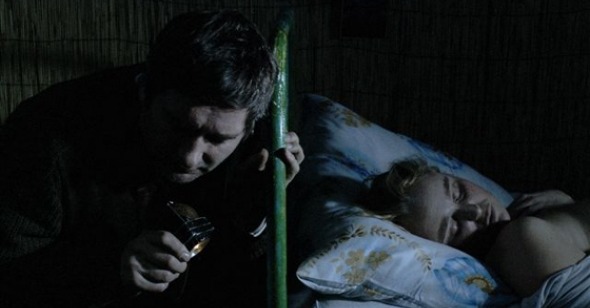Nocturnal Mission
By Leo Goldsmith
Four Nights with Anna
Dir. Jerzy Skolimowski, Poland, no U.S. distributor
Grey and waterlogged, Jerzy Skolimowski's Four Nights with Anna is something like the Eastern European answer to Rear Window and Chungking Express, a deeply gothic, but no less romantic tale of voyeurism, breaking and entering, and secret love. Instead of a wheelchair-bound James Stewart, we have Artur Steranko as emotionally crippled ex-con Leon Okrasa, who, like Faye Wong in Wong Kar-wai's film, opts to anonymously clean his beloved's lodgings rather than announce his love. But in Four Nights with Anna, as the title suggests, Leon does his housework (and a few other unsolicited things) nocturnally while Anna, the object of his distorted affection, lies drugged from the crushed sleeping pills Leon has slipped into her sugar.
Four Nights with Anna is Polish auteur Skolimowski's first film in 17 years—in the meantime he has been painting and occasionally acting, most notably as Naomi Watts's racist Uncle Stepan in David Cronenberg's Eastern Promises. This sabbatical notwithstanding, the film displays a rigorous control of mise-en-scène and mood, crafting something like a thriller out of a character study of Steranko's mousy, bug-eyed docility. As Leon, the Bean-like actor cowers throughout, barely able to make eye contact, often staggering sideways and flopping around in the snowy mud during times of stress.
We are introduced to him skulking around the dreary cobblestone streets of his tiny, glum Polish village, and then lurking Igor-like in the hospital mortuary where he works. Peering through one lens of a broken pair of binoculars, Leon passively observes the world from a distance—it is only under cover of darkness that he becomes active (even weirdly amorous) in his nightly visits to Anna's domicile, where he tidies up, befriends her cat, sews buttons on her nurse's uniform, and paints her toenails.
Following the death of his grandmother (for whom he similarly served as servant and caretaker) and then his dismissal from his position at the mortuary, this nightly activity becomes the sole focus of Leon's energies and the only thing to which he seems at all committed in the film's duration. Almost comically pathetic and jittery throughout, Steranko gives a distinctly one-note performance, which is only engaging for the pieces of information that Skolimowski (temporarily) withholds. Somewhere along the way, we learn that Anna was the victim of a rape that Leon witnessed and, as we learn in a deeply frustrating flashback, did nothing to stop, and for which he served a protracted and traumatic prison sentence, during which he was, of course, also raped. In this light, his visits to Anna and his affection for her seem both more purposeful, as an attempt to redress his past wrongs, and more problematic, as a repetition of the invasive violence of rape.
By emphasizing Leon's inner turmoil over Anna's—and indeed by giving her very little to say for herself, leaving her prostrate and snoring for much of her screen time—Four Nights with Anna leaves itself very much open to charges of misogyny. It remains unclear whether Skolimowski would have us take Leon's nightly creeping as an almost heroic gesture, a sheepish and weirdly sweet attempt to break through his emotional immobility, or a merely ghoulish activity of an emotional recluse. But the film is so highly stylized, with lofty camerawork, gorgeously precise lighting surrounded by deep pools of darkness, and a rich, expressionistic score, that one imagines Skolimowski is trying to provoke all of these reactions: repulsion, pity, even comedy, however pitch black. The mysterious, elliptical structure helps to evoke this eerily tender mood in Leon's secret love affair, as do the unexpected touches of surrealism throughout: a severed hand, a dead cow floating downstream, a burning cuckoo clock. These images, coupled with interpolated scenes from Leon's tortured past, suggest the disorientation of the protagonist's fractured consciousness, making him more like a Kafka character—confused, humiliated, disempowered—than a mere shifty pervert. The victim of blithely unsympathetic authority figures and of his own shyness and passivity, Leon finally seems less sinister than pitiable.
